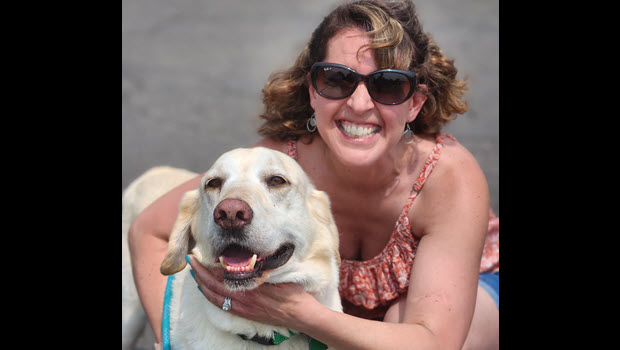Nationwide data show that as many as one in three teachers works a second job, and Connecticut educators are no exception.
Shana Luzusky, sixth grade French and Spanish teacher and team leader at West Hartford’s King Philip Middle School, is one of the thousands of Connecticut educators with a paid and/or volunteer side hustle. Luzusky brings the art of communication into her off-campus pursuits, where she volunteers as an adoption coordinator for a dog rescue.
“It started back in 2008, when I had a two-year-old chocolate lab and decided I would foster other dogs who needed homes,” she recalls. “I would get a weekly list, and there was this huge yellow lab/Great Dane mix who was snappy with other dogs at adoption events. She had other challenges too, so…I ended up keeping her!”
Luzusky became an adoption coordinator for Labs4Rescue, which finds homes for Labrador retrievers, golden retrievers, and various mixes.
“I did some shadowing to learn the ins and outs and eventually got a request to handle dog adoptions from Mobile, Alabama, southern Mississippi’s Gulfport area, and Arkansas, where large numbers of companion animals are abandoned. It’s hard to find fosters down
south, but I work to coordinate care, shelter, and affordable veterinary treatment—what we call ‘rescue friendly’ vets who will provide low-cost vaccines and spay/neuter operations.”
Luzusky also interviews prospective adopters, schedules home visits, does vet checks before dogs are transported, and organizes 48-hour quarantines for dogs in states that require it to protect against kennel cough, worms, parvovirus, and other contagious conditions.
“This happens every week,” she says.
Before being adopted, dogs spend two or more weeks in foster homes, which gives Labs4Rescue a chance to learn what they need. In that time, foster families collect bits about the pet’s personality and behaviors. Luzusky takes that information and posts a “dog bio” that gives adopters a realistic idea about each pup while also putting a fun, positive spin on areas that need work.
“Sometimes our foster dogs need socializing, crate training, or behavior training,” she says. “Adopters need to know these things, but instead of saying, ‘This dog might eat a cat,’ I’ll say, ‘I prefer a feline-free home!’ When a foster family describes a puppy who jumps all the time or chews everything in sight, I might say, ‘She’s working on not jumping,’ or ‘Keep your shoes hidden!’”
The same energy Luzusky brings to her volunteer efforts is a hallmark of her advisory and her classroom, where students share in her enthusiasm for other languages and cultures.
“I hope they leave my room with a love of new customs and ways of communicating,” she says.







